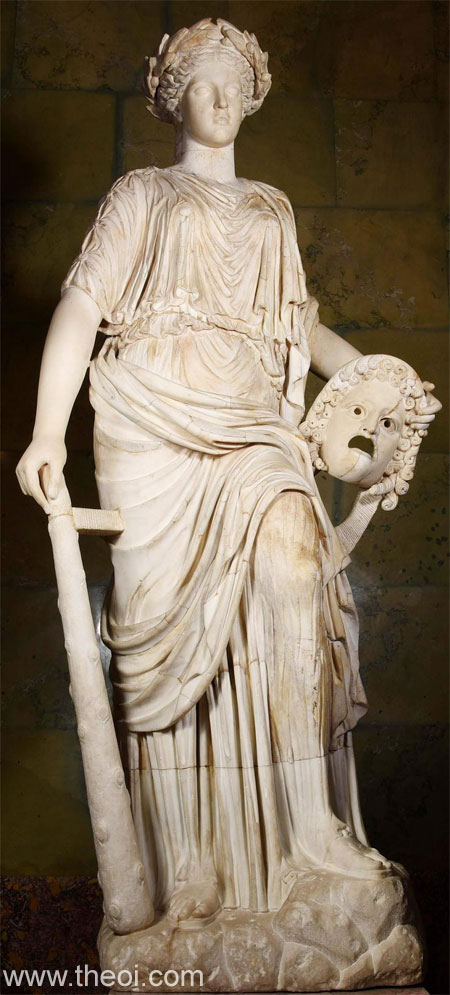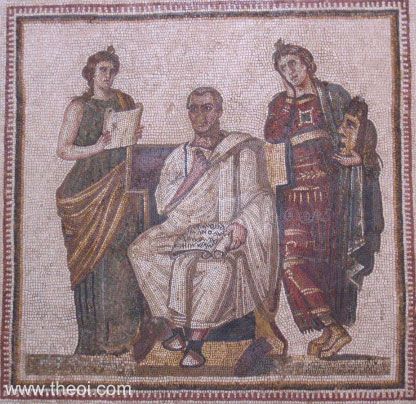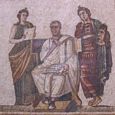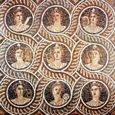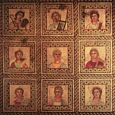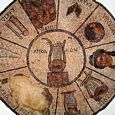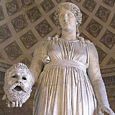Greek Goddess Muse of Tragedy (original) (raw)
Greek Mythology >> Greek Gods >> Olympian Gods >> Muses >> Melpomene
MELPOMENE
Transliteration
Melpomenê
Translation
Celebrate with Song
Muse Melpomene, Greco-Roman marble statue C2nd A.D., State Hermitage Museum
MELPOMENE was one of the nine Mousai (Muses), the goddesses of music, song and dance. In the Classical era, when the Mousai were assigned specific artistic and literary spheres, Melpomene was named Muse of tragedy. In this guise she was portrayed holding a tragic mask or sword, and sometimes wearing a wreath of ivy and cothurnus boots. Her name was derived from the Greek verb melpô or melpomai meaning "to celebrate with dance and song."
FAMILY OF MELPOMENE
PARENTS
ZEUS & MNEMOSYNE (Hesiod Theogony 75, Apollodorus 1.13, Diodorus Siculus 4.7.1, Orphic Hymn 76)
OFFSPRING
THE SEIRENES (by Akheloios) (Apollodorus 1.18 & 1.63, Lycophron 712, Hyginus Fabulae 141)
ENCYCLOPEDIA
MELPO′MENE (Melpomenos), i. e. the singing (goddess), one of the nine Muses, became afterwards the Muse of Tragedy. (Hes. Theog. 77)
Source: Dictionary of Greek and Roman Biography and Mythology.
CLASSICAL LITERATURE QUOTES
Hesiod, Theogony 75 ff (trans. Evelyn-White) (Greek epic C8th or C7th B.C.) :
"The Mousai (Muses) sang who dwell on Olympos, nine daughters begotten by great Zeus, Kleio (Clio) and Euterpe, Thaleia (Thalia), Melpomene and Terpsikhore (Terpsichore), and Erato and Polymnia (Polyhymnia) and Ourania (Urania) and Kalliope (Calliope)."
Pseudo-Apollodorus, Bibliotheca 1. 13 (trans. Aldrich) (Greek mythographer C2nd A.D.) :
"Mnemosyne [bore to Zeus] the Mousai (Muses), the eldest of whom was Kalliope (Calliope), followed by Kleio (Clio), Melpomene, Euterpe, Erato, Terpsikhore (Terpsichore), Ourania (Urania), Thaleia (Thalia), and Polymnia."
Pseudo-Apollodorus, Bibliotheca 1. 18 :
"Melpomene bore to Akheloos (Achelous) the Seirenes (Sirens), whom we shall discuss in the course of the tale of Odysseus."
Lycophron, Alexandra 712 ff (trans. Mair) (Greek poet C3rd B.C.) :
"The triple daughters [the Seirenes (Sirens)] of Tethys' son [Akheloos (Achelous)], who imitated the strains of their melodious mother [Melpomene]."
Virgil and the Muses Clio and Melpomene, Greco-Roman mosaic A.D., Bardo National Museum
Diodorus Siculus, Library of History 4. 7. 1 (trans. Oldfather) (Greek historian C1st B.C.) :
"Hesiod even gives their [the Mousai (Muses)] names when he writes: ‘Kleio (Clio), Euterpe, and Thaleia (Thalia), Melpomene, Terpsikhore (Terpsichore) and Erato, and Polymnia, Ourania (Urania), Kalliope (Calliope) too, of them all the most comely.’
To each of the Mousai (Muses) men assign her special aptitude for one of the branches of the liberal arts, such as poetry, song, pantomimic dancing, the round dance with music, the study of the stars, and the other liberal arts . . . For the name of each Mousa (Muse), they say, men have found a reason appropriate to her: . . . Melpomene, from the chanting (melodia) by which she charms the souls of her listeners."
Orphic Hymn 76 to the Muses (trans. Taylor) (Greek hymns C3rd B.C. to 2nd A.D.) :
"Daughters of Mnemosyne and Zeus . . . Kleio (Clio), and Erato who charms the sight, with thee, Euterpe, ministering delight: Thalia flourishing, Polymnia famed, Melpomene from skill in music named: Terpsikhore (Terpsichore), Ourania (Urania) heavenly bright."
Philostratus the Younger, Imagines 13 (trans. Fairbanks) (Greek rhetorician C3rd A.D.) :
"[Ostensibly a description of an ancient Greek painting :] Why do you delay, O divine Sophokles (Sophocles) [the tragedian], to accept the gifts of Melpomene? Whey do you fix your eyes upon the ground? Since I for one do not know whether it is because you are now collecting your thoughts, or because you are awe-stricken at the presence of the goddess. But be of good heart, good sir, and accept her gifts; for the gifts of the gods are not to be rejected . . . Indeed you see how the bees fly above you, and how they buzz with a pleasant and divine sound as they anoint you with mystic drops of their own dew, since this more than anything else is to be infused into your poesy. Surely someone will before long cry out, naming you the ‘honeycomb of kindly Mousai (Muses),’ and will exhort everyone to beware lest a bee fly unnoticed from your lips and insert its sting unawares. You can doubtless see the goddess herself imparting to you now sublimity of speech and loftiness of thought, and measuring out the gift with gracious smile."
Pseudo-Hyginus, Fabulae 141 (trans. Grant) (Roman mythographer C2nd A.D.) :
"The Sirenes (Sirens), daughter of the River Achelous and the Muse Melpomene."
Propertius, Elegies 3. 3 (trans. Goold) (Roman elegy C1st B.C.) :
"The nine Maidens (Puellae) [Muses], each allotted her own realm, busy their tender hands on their separate gifts: one [Melpomene] gathers ivy for the thyrsus-wand."
ANCIENT GREEK & ROMAN ART
Z20.5 Melpomene, Clio, Virgil
Greco-Roman Tunis Floor Mosaic A.D.
Z20.2 Portraits of the Nine Muses
Greco-Roman Cos Floor Mosaic A.D.
Z20.3 Portraits of the Nine Muses
Greco-Roman Trier Mosaic C3rd A.D.
Z20.4 Symbols of the Nine Muses
Greek Elis Floor Mosaic C1st B.C.
S20.1 Statue of Melpomene
Greco-Roman Marble Statue C1st B.C.
SOURCES
GREEK
- Hesiod, Theogony - Greek Epic C8th - 7th B.C.
- Apollodorus, The Library - Greek Mythography C2nd A.D.
- Lycophron, Alexandra - Greek Poetry C3rd B.C.
- Diodorus Siculus, The Library of History - Greek History C1st B.C.
- The Orphic Hymns - Greek Hymns C3rd B.C. - C2nd A.D.
- Philostratus the Younger, Imagines - Greek Rhetoric C3rd A.D.
ROMAN
- Hyginus, Fabulae - Latin Mythography C2nd A.D.
- Propertius, Elegies - Latin Elegy C1st B.C.
BIBLIOGRAPHY
A complete bibliography of the translations quoted on this page.
